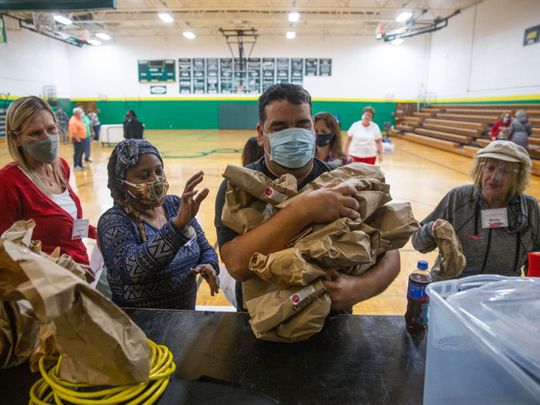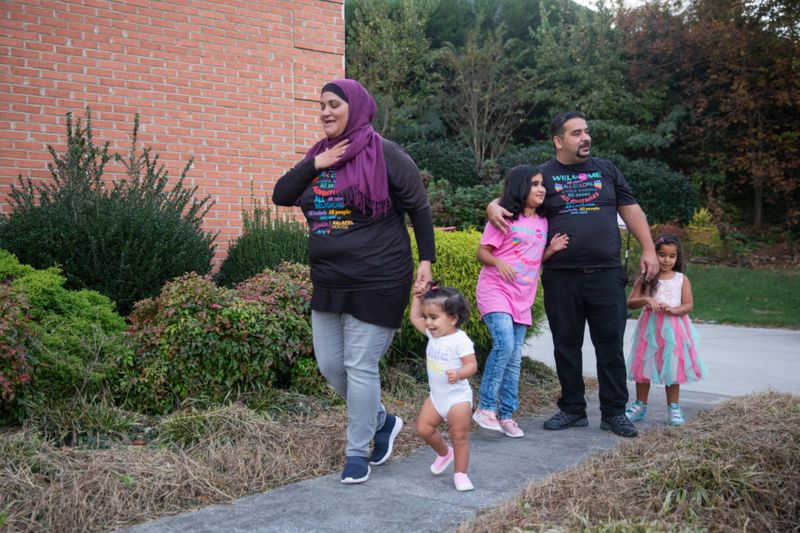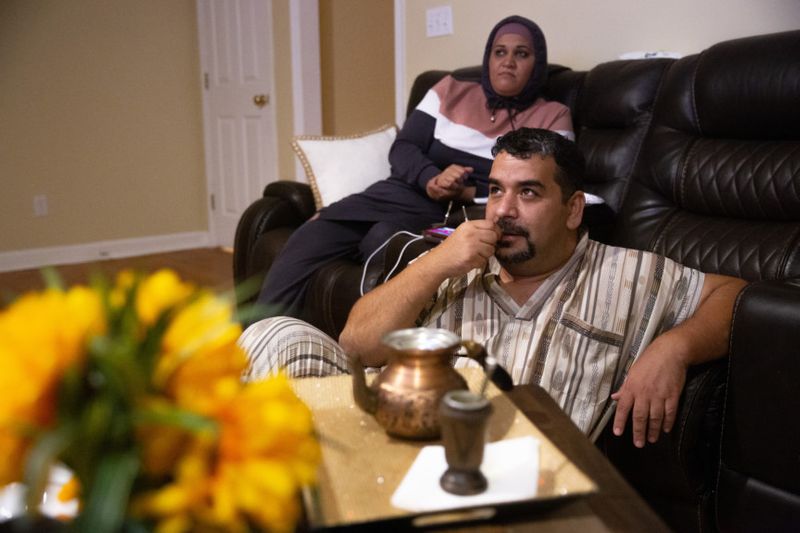
Knoxville, Tennessee: As the polls closed Tuesday, falafel restaurant owner Yassin Terou took 150 sandwiches to election workers at Bearden Middle School from the trunk of his black SUV. To the volunteers who had been working for 12 hours, it was like manna from heaven.
“Yassin is here!” one worker said.
“Yassin! Of course!” said another.
“God bless you,” said, Susan Affel, a volunteer who had been peeling election signs off the gymnasium walls. “This is the first time we’ve been fed since I’ve been doing this.”
With the gift of sandwiches, Terou was celebrating his first American election vote, after becoming a citizen earlier this year.
Crosscurrents of this polarisation
This election was special for another reason: It gave him a chance to help end President Donald Trump’s ban on immigration from many Muslim-majority countries. Terou’s brother and father are Syrian refugees living in Turkey, unable to come to America. His father, nearly 70, lives in a wheelchair due to heart conditions and diabetes.
Trump’s “Muslim Ban,” which led to large national protests in 2017, was blocked by several courts and eventually upheld by the Supreme Court in 2018. Democratic presidential candidate Joe Biden has said that on his first day in office, he will overturn the ban, which includes people who are from Terou’s birth country of Syria.
Americans remain deeply divided over the ban. And Terou, along with millions of other Muslims in the United States, have experienced the crosscurrents of this polarisation. Hate crimes against Muslims have increased in the last four years. But so has the prominence of Muslims in American life.
Terou’s restaurant was vandalised earlier this year when someone threw a smoke bomb into his store. But the 37-year-old has also become a beloved fixture in Knoxville as the owner of Yassin’s Falafel House.
American Dream
As he sends a daily WhatsApp voice message to his father and brother in Turkey, he wishes they could join his American Dream. Terou said that while his father’s situation in Turkey is better than it was in Syria, he believes he could get better medical care in the US. And if he were here, “he could be more connected to his grandchildren,” he said. But Terou is fearful. The Thursday before the election - the same day he cast his vote as part of early voting - Trump tweeted that Biden was planning to resume accepting refugees from “terror-compromised nations such as Syria” and open “the floodgates to Radical Islamic Terror.”
“I don’t think Trump should make people fear others,” Terou said. “It felt like a stab in the back.”
On the morning of Election Day, Terou stopped by one of his two restaurants to get things moving before the shop opened. He dropped falafels into oil and set a timer for 3 minutes, 48 seconds, sauted shawarma and shaved gyro slices. The restaurant was decorated with two dozen American flags and a large sign reads: “All sizes, all colours, all ages, all sexes, all cultures, all types, all religions, all beliefs, all people, safe here at Yassin’s Falafel House.”
His menu, when he launched in 2014, started with very simple ingredients adapted to American tastes. He says there are two kinds of Americans: people who avoid spice and people who want “American spicy.”
“Our spicy is not one that will make anyone cry, but you will feel the heat,” he said.
Initially, he said, he decorated his restaurant walls with Syrian pounds and American dollars as a way to represent his identity, and then his customers began to tape up more currency from their international travels.
Terou was born and raised in Damascus, the capital of Syria, and his father worked in the government. With just $300 in cash, he moved to the United States in 2011 on an F-2 visa and later applied for asylum as Syria became engulfed in a civil war. He brought with him only a suitcase and his falafel maker because he assumed he would go back to Syria. He relied on a local mosque for assistance with food and clothing,and eventually, he began to sell sandwiches to people there. A member of the mosque helped him get enough credit to start his first restaurant in downtown Knoxville. He later opened a second location.
In 2015, Terou married his wife, a Palestinian who moved here from Jordan when she was a child. Through his wife, who is a citizen, he was able to apply for a green card and became a citizen in June. They have three girls.

Terou’s 10-year-old daughter, Judy, who was having trouble doing online work for Islamic school, started public school for the first time last week. He explained to her that she might look different from her classmates and that due to their religious beliefs, they do some things differently, like not eat pork.
Knoxville celebrity
Terou’s family loves life here and they have no plans to leave. Judy has talked about running for president some day.
Terou has become a Knoxville celebrity, praised for donating food after a tornado in Nashville earlier this year and during a government shutdown in 2018. His restaurant won “Nicest Place in America” by Reader’s Digest, featured by “Good Morning America.”
This year, Terou has chosen to keep his dining room closed due to the coronavirus, even though indoor dining in the state is allowed. But he still gets a steady stream of takeout and delivery orders, and is hiring new employees.
He has hired about 25 refugees since he opened, and employees working in his kitchen on the morning of the election were very diverse, with two workers who were Black, three who are Arab and three who were White.
“My team reflects America,” he said.
During Trump’s campaign in 2015, he called for “a total and complete shutdown of Muslims entering the United States.” That campaign promise, Terou said, troubled him.
On the day after the 2016 election, Terou said his customers - both Republicans and Democrats - came into the store and gave him hugs. On Tuesday, one of the poll workers, Moira Binder, went up to Terou as he gave out sandwiches, reminded him that she had been one of the customers who came in four years ago to provide him support.
“There’s such an atmosphere of fear, and he’s the kindest man,” Binder said, calling him “a Knoxville treasure.” “Plus, he has great food.”
This election, he said, he is anxiously waiting to see the ban overturned before he puts his father and brother through the formal process of trying to bring them to the United States.
Observers say that the impact of Trump’s ban will be lasting, even if the ban is overturned. In the months after his election, surveys found that Muslims experienced discrimination and other forms of anti-Muslim bigotry, including hate crimes.
The ban was also a painful reminder, for many Muslims, of how they feel they have been treated with suspicion since 9/11, since the government singled out Muslims in the name of national security.
Trump’s ban applies to nearly all citizens of five Muslim-majority countries, as well as Venezuela and North Korea. A State Department official told members of Congress in 2019 that the Trump administration has fielded 72,000 visa applications from the five Muslim-majority countries, and about 10 per cent of those applicants received waivers to enter the United States.
The US government was on pace to separate an estimated 15,000 spouses and adopted minor children of US citizens under the ban by September 30, 2019, according to the Cato Institute, a libertarian think tank in Washington.
“For a family that has been separated for several years, they’re not getting that time back,” said Shoba Sivaprasad Wadhia, a professor at Penn State Law. “The lasting effects of separation are not going to be repaired on [Biden’s] Day 1.”
Many Muslim observers said that while they felt the policy emboldened Islamophobia, a backlash against Trump also caused more people to sympathise with Muslims.
“The Muslim ban galvanised so many people,” said Dalia Mogahed, director of research at the Institute for Social Policy and Understanding, a Muslim research organisation. “It gave them a concrete policy to rally around and point against. It has been a touchstone for a wider problem that sometimes people deny exist.”

Since Trump came into office, polls also show that American views towards Islam have become slightly more favourable, and many Muslims have been heralded in cultural and political life. The impact of the ban also mirrors the country’s polarisation. During Trump’s administration, Republicans have become more supportive of the ban, according to PRRI, while Democrats have become even more opposed.
Since the ban, Muslims have also become more visible in politics, culture and in everyday life. During the Trump administration, Rep. Rashida Tlaib, Democrat, Michigan., and Rep. Ilhan Omar, Democrat, Minnesota, became the first two Muslim women elected to Congress. Five states elected first-ever Muslim lawmakers in this election.
3.45 million Muslims live in America
In pop culture, Mahershala Ali won an Academy Award for best actor, Hasan Minhaj hosted his own Netflix show and Ramy Youssef won a Golden Globe for best actor. Big brands are catching on: Nike released a hijab among its performance wear, Gap released an ad with a hijab-wearing girl and Sports Illustrated featured a hijab-wearing athlete.
About 3.45 million Muslims live in the United States, making up 1.1 per cent of the population, and they are expected to replace Jews as the nation’s second largest religious group after Christians by 2040, according to the Pew Research Centre. About two-thirds of Americans who are Muslim are immigrants.
Mogahed said that some in the Muslim community are uncomfortable with the mainstreaming of Muslims in America because they are worried they might have to compromise their religious or cultural traditions.
“By highlighting these success stories, are we saying that people have to be these exceptional success stories for Americans to accept them?” she said. “Can they be ordinary people like everyone else?”
“We will see what God wants.”
After giving sandwiches out to poll workers, Terou went home to his four-bedroom house and settled into a recliner in his living room, his eyes glued to the 65-inch TV above the fireplace.
Throughout election night, he fiddled with his phone, the baby monitor and the remote, checking state elections and news alerts. In Syria he would check the state media and the revolutionaries’ media so he had to check both Fox News and CNN. He wouldn’t say whom he voted for, but he said he preferred the candidate who said he wanted to unite the country.
It was no surprise to him that Tennessee was one of the early states called for Trump. A lot of his customers come into his store with MAGA hats. When the early results looked as though the president could pull off another victory, text messages started streaming in.
A friend texted him, “Well, your family’s not going to be here for another four years,” he wrote when it seemed as though Trump could win.
“It’s a mean joke, but we’re friends,” Terou said.
Another text was a video a friend made of himself making grape leaves as a way to deal with the stress of not knowing the outcome.
“We can’t have wine as Muslims, so we need another ways of destressing,” Terou explained.
A friend who supports Trump texted him and said, “I’m feeling good.”
Terou didn’t text back.
Growing nervous, Terou moved to the floor and began cracking open pistachios. With one knee up, he rubbed his temples.
“It’s not just about the election,” he said. “It’s about what’s going to happen next. What Trump says affects the whole community.”
Around 1am, his brother who was waking up in Turkey asked him through WhatsApp what was going on in the United States. He told him it wasn’t clear, that the states were still counting votes.
“We will see what God wants,” he said.








